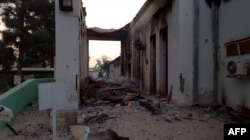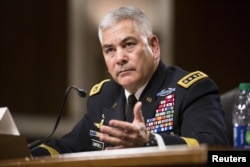Doctors Without Borders said Thursday that 33 people are still missing days after the U.S. airstrike on the international medical charity's hospital in Kunduz, Afghanistan killed 22 others.
The medical group, known by its French acronym MSF, said nine of the unaccounted for are patients and 24 staff members. He said more bodies could be found inside the hospital, but MSF is waiting to regain access to the facility after ending its operations in Kunduz.
"We are still in shock," said Guilhem Molinie, the group's Afghanistan representative told reporters in Kabul. "We lost many colleagues and at the moment it's clear that we don't want to take the risk for any of our staff. We don't control the hospital."
MSF ended its Kunduz operations after the aerial bombardment last Saturday and has demanded an independent investigation into the attack under the Geneva Conventions. The group says probes under way by the U.S., Afghanistan and NATO are insufficient and has suggested that the attack amounted to a war crime. Those killed in the airstrike included 10 patients and 12 MSF staff members.
Obama apologizes
U.S. President Barack Obama apologized Wednesday to the medical group's president, Dr. Joanne Liu, for the attack, launched by the U.S. after Afghan forces requested help to rout Taliban fighters from inside the hospital compound.
White House spokesman Josh Earnest said Obama called Liu to "apologize and express condolences."
"In this case, there was a mistake and it's one that the U.S. owns up to," Earnest said. He said Obama "is very eager to get to the bottom of what exactly occurred."
In a statement issued Wednesday afternoon, Liu acknowledged receiving Obama's call, but repeated her earlier demand for an independent panel "to establish what happened in Kunduz, how it happened and why it happened."
The Geneva Conventions are a set of international treaties and protocols regulating the conduct of armed conflict and aim to protect people not taking part in hostilities and those who are no longer doing so.
Hours before her conversation with President Obama, Liu said the organization, known by its French acronym MSF, cannot rely on the internal probes being conducted by the U.S., Afghanistan and NATO.
White House spokesman Earnest, however, rejected the notion that the attack was a war crime, saying that "no one has offered any evidence that it's anything but a terrible, tragic mistake."
Obama also called Afghan President Ashraf Ghani to voice his condolences for the innocent loss of lives in the incident, the spokesman said, and to commend Afghan forces for their bravery in the fight to control the northern Afghan city in clashes with Taliban insurgents.
US probe
Meanwhile, U.S. officials are probing whether the military exceeded its authority for use of force in Afghanistan in launching the airstrike.
The top U.S. commander in Afghanistan, Army General John Campbell, says the United States is taking the blame for carrying out the raid after Afghan forces requested it to attack Taliban insurgents it believed were firing from inside the medical facility. But the question remains whether the U.S. should have agreed to the attack.
When Obama ended American ground combat operations in Afghanistan last year, he said that the residual force of 9,800 U.S. troops remaining there should focus on training and advising Afghan troops. He limited the use of force to three circumstances: the defense of U.S. and allied troops, support for missions targeting remnants of al-Qaida insurgents in Afghanistan, and assisting Afghan troops facing mass casualties in extreme situations.
It is not clear whether the U.S. bombing of the hospital met any of those criteria.
Campbell told a congressional committee Tuesday the hospital was "mistakenly struck" and the United States "would never intentionally target a protected medical facility."
He said he has ordered American forces in Afghanistan to be retrained on their use of force.
"To prevent any future incidences of this nature," he said, "I've directed the entire force to undergo in-depth training in order to review all of our operational authorities and rules of engagement."
U.S. Defense Secretary Ash Carter said in a statement, "The U.S. military takes the greatest care in our operations to prevent the loss of innocent life, and when we make mistakes, we own up to them. That is exactly what we are doing right now. We will do everything we can to understand this tragic incident, learn from it, and hold people accountable as necessary."
Afghan forces have been trying for several days to regain full control of Kunduz in the northern part of the country after Taliban insurgents briefly seized it last week.






